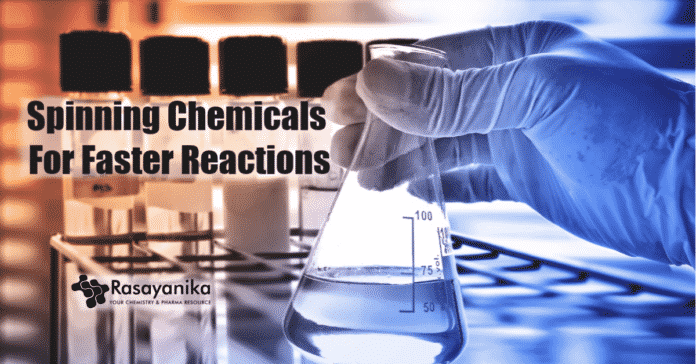Faster Reactions By Spinning Chemicals
A new way of making reactions up to 70 times faster by utilizing state-of-the-art tools to spin chemicals around was developed by scientists from Cardiff University.
The scientists discovered that triggering the reaction to happen much faster can be achieved by efficient mixing within a chemical reaction spinning chemicals and catalysts around in a small tube.
The outcomes of the study can have an extensive influence on the way that chemicals are made in a variety of industries, from drug development to agriculture and other industries.
Allowing the study group to broaden their discoveries in partnership with the industry, they have led to the award of a major research grant from the Biotechnology and Biological Sciences Research Council (BBSRC).
The concept is based on flow chemistry, in which chemical reactions occur continuously in a flowing stream of liquid within a tube or a pipe, instead of more conventional “batch production” techniques, where chemicals are added into a vessel such as a flask and the product is then accumulated.
The way chemical reactions are done is changed by flow chemistry, giving much safer, quicker reactions, a
nd cleaner outputs.The reaction can be improved by adding a catalyst into a flow system. However, the routes to enhance the mixing of chemicals without compromising on factors such as selectivity and reactivity is been researched by the group from the School of Chemistry.
Professor Rudolf Allemann and Professor Thomas Wirth explored a technique called high-performance counter-current chromatography in their research, in which chemicals and catalysts in a small tube are spun around.
The outcomes of the study revealed that utilizing this spinning technique, chemical reactions could be carried out approximately 70 times faster.
The novel use of high-performance counter-current chromatography equipment for super-efficient mixing is extremely amazing. Now we can accelerate reactions via rapid mixing and get rapid access to essential chemical compounds and the commercial use of the effects untangled by our study teams is accessible, as big versions of these machines exist, said Professor Wirth while talking about the findings of the study.
The study on ‘Spinning chemicals for faster reactions’ is published in the journal Angewandte Chemie.
Author: Sruthi S

















































